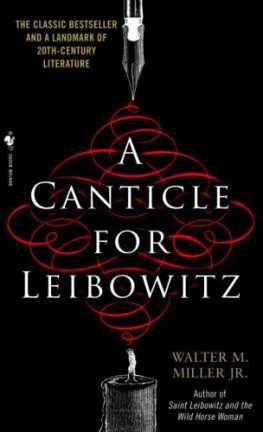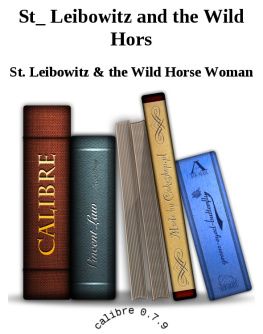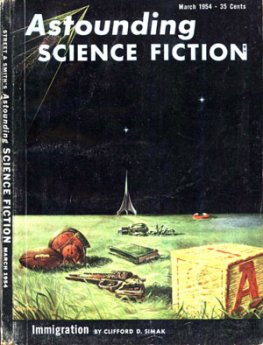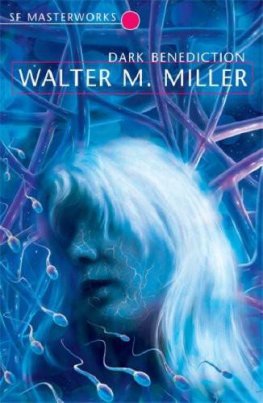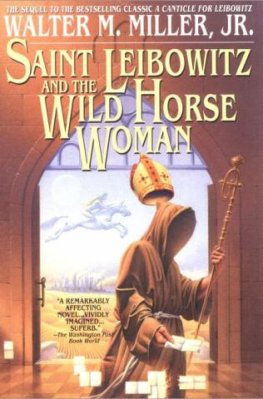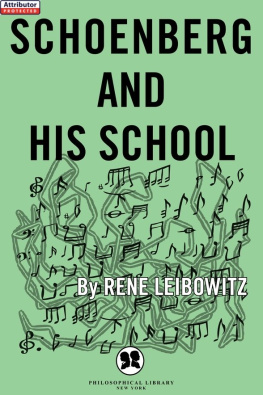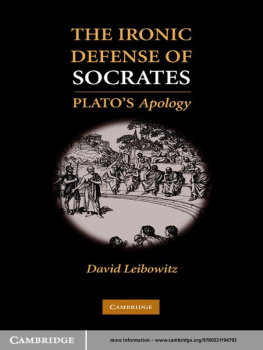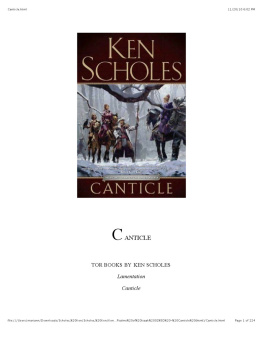Walter M. Miller Jr. - A Canticle for Leibowitz
Here you can read online Walter M. Miller Jr. - A Canticle for Leibowitz full text of the book (entire story) in english for free. Download pdf and epub, get meaning, cover and reviews about this ebook. year: 1959, genre: Detective and thriller. Description of the work, (preface) as well as reviews are available. Best literature library LitArk.com created for fans of good reading and offers a wide selection of genres:
Romance novel
Science fiction
Adventure
Detective
Science
History
Home and family
Prose
Art
Politics
Computer
Non-fiction
Religion
Business
Children
Humor
Choose a favorite category and find really read worthwhile books. Enjoy immersion in the world of imagination, feel the emotions of the characters or learn something new for yourself, make an fascinating discovery.
- Book:A Canticle for Leibowitz
- Author:
- Genre:
- Year:1959
- Rating:4 / 5
- Favourites:Add to favourites
- Your mark:
- 80
- 1
- 2
- 3
- 4
- 5
A Canticle for Leibowitz: summary, description and annotation
We offer to read an annotation, description, summary or preface (depends on what the author of the book "A Canticle for Leibowitz" wrote himself). If you haven't found the necessary information about the book — write in the comments, we will try to find it.
A Canticle for Leibowitz — read online for free the complete book (whole text) full work
Below is the text of the book, divided by pages. System saving the place of the last page read, allows you to conveniently read the book "A Canticle for Leibowitz" online for free, without having to search again every time where you left off. Put a bookmark, and you can go to the page where you finished reading at any time.
Font size:
Interval:
Bookmark:
Walter M. Miller, Jr.
a dedication is only
a scratch where it itches
for ANNE, then
in whose bosom RACHEL lies
muselike
guiding my clumsy song,
and giggling between the lines
-with blessings, Lass
W
ACKNOWLEDGMENT
To all those whose assistance, in various ways, contributed to making this book possible, the author expresses his appreciation and gratitude, especially and explicitly to the following: Mr. and Mrs. W. M. Miller, Sr., Messrs. Don Congdon, Anthony Boucher, and Alan Williams, to Dr. Marshal Taxay, the Reverend Alvin Burggraff, C.S.P., to Ss Francis and Clare, and to Mary, for reasons known to each of them.
Fiat Homo
Brother Francis Gerard of Utah might never have discovered the blessed documents, had it not been for the pilgrim with girded loins who appeared during that young novices Lenten fast in the desert.
Never before had Brother Francis actually seen a pilgrim with girded loins, but that this one was the bona fide article he was convinced as soon as he had recovered from the spine-chilling effect of the pilgrims advent on the far horizon, as a wiggling iota of black caught in a shimmering haze of heat. Legless, but wearing a tiny head, the iota materialized out of the mirror glaze on the broken roadway and seemed more to writhe than to walk into view, causing Brother Francis to clutch at the crucifix of his rosary and mutter an Ave or two. The iota suggested a tiny apparition spawned by the heat demons who tortured the land at high noon, when any creature capable of motion on the desert (except the buzzards and a few monastic hermits such as Francis) lay motionless in its burrow or hid beneath a rock from the ferocity of the sun. Only a thing monstrous, a thing preternatural, or a thing with addled wits would hike purposefully down the trail at noon this way.
Brother Francis added a hasty prayer to Saint Raul the Cyclopean, patron of the misborn, for protection against the Saints unhappy proteges. (For who did not then know that there were monsters in the earth in those days? That which was born alive was, by the law of the Church and the law of Nature, suffered to live, and helped to maturity if possible, by those who had begotten it. The law was not always obeyed, but it was obeyed with sufficient frequency to sustain a scattered population of adult monsters, who often chose the remotest of deserted lands for their wanderings, where they prowled by night around the fires of prairie travelers.) But at last the iota squirmed its way out of the heat risers and into clear air, where it manifestly became a distant pilgrim; Brother Francis released the crucifix with a small Amen.
The pilgrim was a spindly old fellow with a staff, a basket hat, a brushy beard, and a waterskin slung over one shoulder. He was chewing and spitting with too much relish to be an apparition, and he seemed too frail and lame to be a successful practitioner of ogre-ism or highwaymanship. Nevertheless, Francis slunk quietly out of the pilgrims line of sight and crouched behind a heap of nibbled stone where he could watch without being seen. Encounters between strangers in the desert, while rare, were occasions of mutual suspicion, and marked by initial preparations on both sides for an incident that might prove either cordial or warlike.
Seldom more than thrice annually did any layman or stranger travel the old road that passed the abbey, in spite of the oasis which permitted that abbeys existence and which would have made the monastery a natural inn for wayfarers if the road were not a road from nowhere, leading nowhere, in terms of the modes of travel in those times. Perhaps, in earlier ages, the road had been a portion of the shortest route from the Great Salt Lake to Old El Paso; south of the abbey it intersected a similar strip of broken stone that stretched east- and westward. The crossing was worn by time, but not by Man, of late.
The pilgrim approached within hailing distance, but the novice stayed behind his mound of rubble. The pilgrims loins were truly girded with a piece of dirty burlap, his only clothing except for hat and sandals. Doggedly he plodded ahead with a mechanical limp while assisting his crippled leg with the heavy staff. His rhythmic gait was that of a man with a long road behind him and a long way yet to go. But, upon entering the area of the ancient ruins, he broke his stride and paused to reconnoiter.
Francis ducked low.
There was no shade amid the cluster of mounds where a group of age-old buildings once had been, but some of the larger stones could, nevertheless, provide cooling refreshment to select portions of the anatomy for travelers as wise in the way of the desert as the pilgrim soon proved himself to be. He searched briefly for a rock of suitable proportions. Approvingly, Brother Francis noted that he did not grasp the stone and rashly tug, but instead, stood at a safe distance from it and, using his staff as a lever and a smaller rock for a fulcrum, he jostled the weightier one until the inevitable buzzing creature crawled forth from below. Dispassionately the traveler killed the snake with his staff and flipped the stillwriggling carcass aside. Having dispatched the occupant of the cool cranny beneath the stone, the pilgrim availed himself of the cool crannys ceiling by the usual method of overturning the stone. Thereupon, he pulled up the back of his loincloth, sat with his withered buttocks against the stones relatively chilly underside, kicked off his sandals, and pressed the soles of his feet against what had been the sandy floor of the cool cranny. Thus refreshed, he wiggled his toes, smiled toothlessly and began to hum a tune. Soon he was singing a kind of crooning chant in a dialect not known to the novice. Weary of crouching, Brother Francis shifted restlessly.
While he sang, the pilgrim unwrapped a biscuit and a bit of cheese. Then his singing paused, and he stood for a moment to cry out softly in the vernacular of the region: Blest be Adonoi Elohim, King of All, who maketh bread to spring forth from the earth, in a sort of nasal bleat. The bleat being finished, he sat again, and commenced eating.
The wanderer had come a long way indeed, thought Brother Francis, who knew of no adjacent realm governed by a monarch with such an unfamiliar name and such strange pretensions. The old man was making a penitential pilgrimage, hazarded Brother Francis-perhaps to the shrine at the abbey, although the shrine was not yet officially a shrine, nor was its saint yet officially a saint. Brother Francis could think of no alternate explanation of the presence of an old wanderer on this road leading to nowhere.
The pilgrim was taking his time with the bread and cheese, and the novice grew increasingly restless as his own anxiety waned. The rule of silence for the Lenten fast days did not permit him to converse voluntarily with the old man, but if he left his hiding place behind the rubble heap before the old man departed, he was certain to be seen or heard by the pilgrim, for he had been forbidden to leave the vicinity of his hermitage before the end of Lent.
Still slightly hesitant, Brother Francis loudly cleared his throat, then straightened into view.
Whup!
The pilgrims bread and cheese went flying. The old man grabbed his staff and bounded to his feet.
Creep up on me, will you!
He brandished the staff menacingly at the hooded figure which had arisen from beyond the rock pile. Brother Francis noticed that the thick end of the staff was armed with a spike. The novice bowed courteously, thrice, but the pilgrim overlooked this nicety.
Stay back there now! he croaked. Just keep your distance, sport. Ive got nothing youre after-unless its the cheese, and you can have that. If its meat you want, Im nothing but gristle, but Ill fight to keep it. Back now! back!
Font size:
Interval:
Bookmark:
Similar books «A Canticle for Leibowitz»
Look at similar books to A Canticle for Leibowitz. We have selected literature similar in name and meaning in the hope of providing readers with more options to find new, interesting, not yet read works.
Discussion, reviews of the book A Canticle for Leibowitz and just readers' own opinions. Leave your comments, write what you think about the work, its meaning or the main characters. Specify what exactly you liked and what you didn't like, and why you think so.

